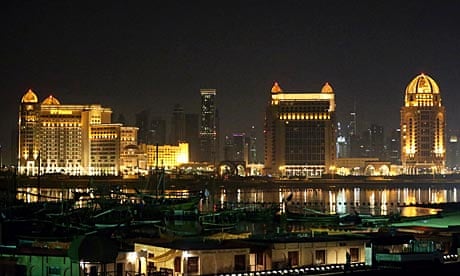Qatar's 2022 World Cup organisers have reiterated their commitment to holding the controversial tournament in summer temperatures of up to 41C (105.8F) despite a growing campaign to move it to the winter. They also claimed that not only would they successfully develop air-conditioned stadiums but would be able to cool entire neighbourhoods for fans.
Hassan al-Thawadi, the secretary general of the Qatar 2022 supreme committee, also rejected repeated corruption allegations and defended the fan experience at a tournament that will take place in a compact area but amid searing heat.
"Fans will come. They will experience a middle eastern World Cup. They will feel safe, they will feel secure, they will feel comfortable and they will have a lot of fun," he said. "They will be physically cool and they will be cool in every sense."
Qatar is believed to be investing £137bn over the next 10 years in infrastructure projects before the World Cup and al-Thawadi claimed that cooling technology would be used over wider areas than originally thought.
"There are two cities where the neighbourhoods use active and passive cooling techniques, whether in terms of shading or the way it brings in the wind," he told the Guardian. "Blowing in the cooled air is the active aspect but at the same time utilising shading techniques. Part of our commitment is that when fans come in they'll enjoy their time here. We made that commitment to the world and we can't back away from it."
Last year the respected stadium designer John Barrow of Populus said the air cooling technology was unsustainable in larger venues. But organisers say the plans are on track. "Populus weren't working on our cooling technology. We've got a prototype coming very soon. It's our commitment, absolutely," said al-Thawadi.
Organisers also said Qatar was not reliant on the tournament moving to winter. The plan has been pushed by the Uefa president, Michel Platini and was supported this week by the former French president Nicolas Sarkozy but has met fierce resistance from European leagues and broadcasters.
Al-Thawadi said he would continue to plan for a summer tournament unless told otherwise by Fifa but that it was for the "football community" to come to a collective decision. "It's the football community's debate. We're moving ahead with our summer bid. If anyone comes back to us and tells us winter or otherwise or suggests it, then we will listen to the football community. In terms of logistics and the cooling technology we are going ahead with that. It is a legacy concept. It opens up two thirds of the world to being able to enjoy their summers and hosting tournaments."
The organising committee met the Fifa president, Sepp Blatter, this week in Doha during the city's Goals conference to update him ahead of next week's Fifa executive committee meeting in Japan. Blatter said the vision outlined in a newly published strategic plan covering the next three years was "impressive".
But Fifa faces three challenging World Cups in a row in Brazil, Russia and Qatar and huge question marks remain over the climate and the logistics of the tournament. A new report last week cast new doubt on Qatar's human rights record, with regard to the migrant workers who have flooded into the country to service the construction boom.
"Most arrive in the country heavily indebted, having borrowed from moneylenders or mortgaged their land to finance inflated travel and visa costs. Their passports are immediately and customarily confiscated and they are typically forced to sign a revised contract that pays them a significantly lower rate than was originally agreed," says the Equal Times report, which echoes the concerns of an earlier Human Rights Watch report.
But al-Thawadi claimed that contracts would hold construction companies to labour laws intended to deal with the problem. "We have recognised there were certain situations the migrant workers faced," he said. "All our construction contracts contain requirements provided by international standards."
